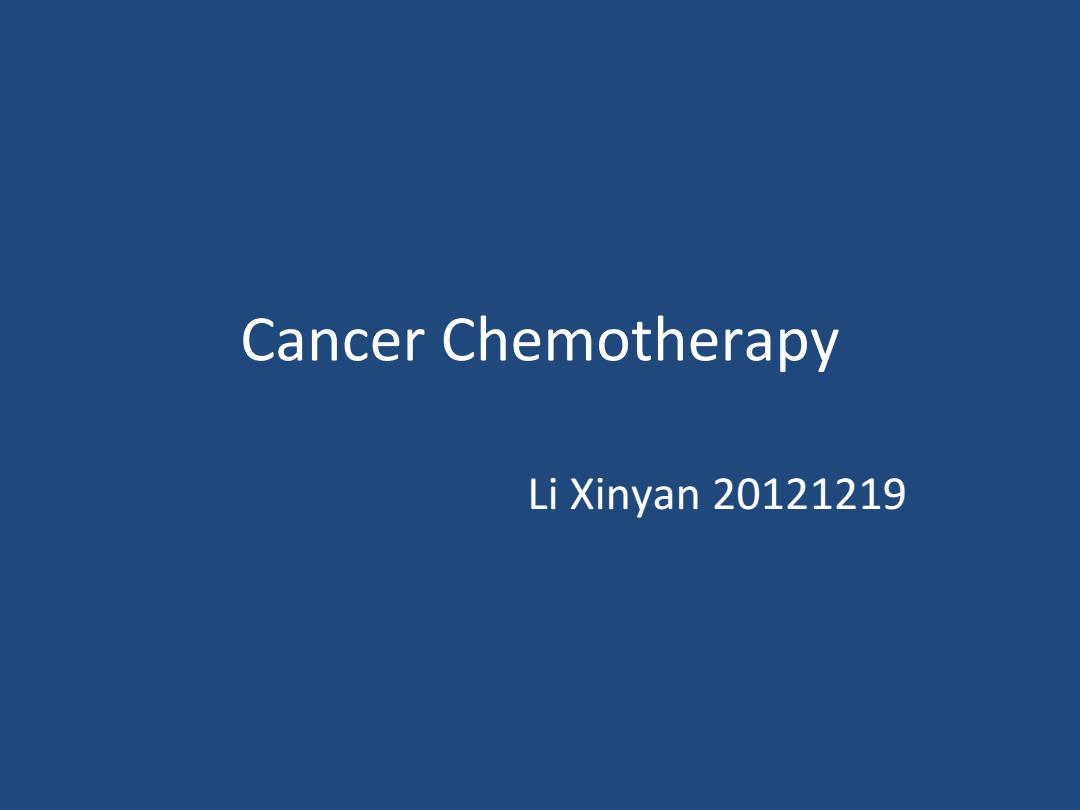
Cancer Chemotherapy Li Xinyan 20121219
Cancer Chemotherapy Li Xinyan 20121219

General Introduction Mechanisms of Chemotherapy Drugs Principles of combination therapies o Classification of Chemotherapy Drugs Toxicity of Chemotherapy Drugs Some Examples for Cancer Chemotherapy
• General Introduction • Mechanisms of Chemotherapy Drugs • Principles of combination therapies • Classification of Chemotherapy Drugs • Toxicity of Chemotherapy Drugs • Some Examples for Cancer Chemotherapy
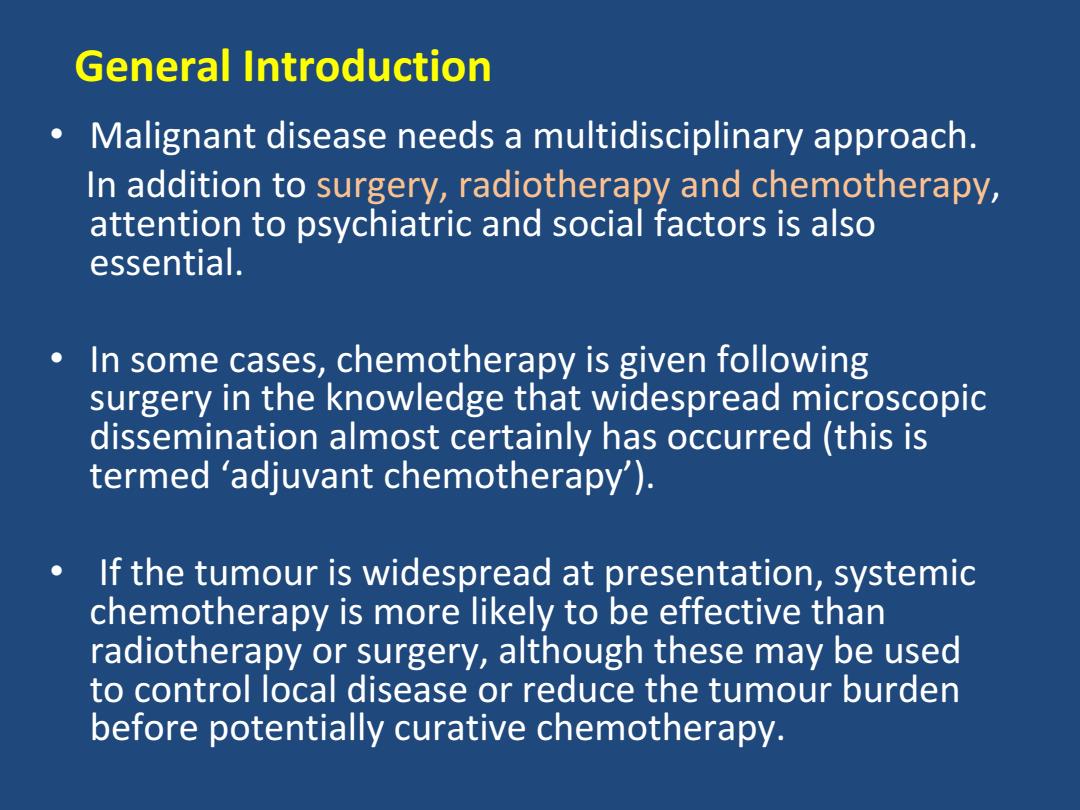
General Introduction Malignant disease needs a multidisciplinary approach In addition to surgery,radiotherapy and chemotherapy, attention to psychiatric and social factors is also essential. In some cases,chemotherapy is given following surgery in the knowledge that widespread microscopic dissemination almost certainly has occurred (this is termed 'adjuvant chemotherapy'). If the tumour is widespread at presentation,systemic chemotherapy is more likely to be effective than radiotherapy or surgery,although these may be used to control local disease or reduce the tumour burden before potentially curative chemotherapy
• Malignant disease needs a multidisciplinary approach. In addition to surgery, radiotherapy and chemotherapy, attention to psychiatric and social factors is also essential. • In some cases, chemotherapy is given following surgery in the knowledge that widespread microscopic dissemination almost certainly has occurred (this is termed ‘adjuvant chemotherapy’). • If the tumour is widespread at presentation, systemic chemotherapy is more likely to be effective than radiotherapy or surgery, although these may be used to control local disease or reduce the tumour burden before potentially curative chemotherapy. General Introduction
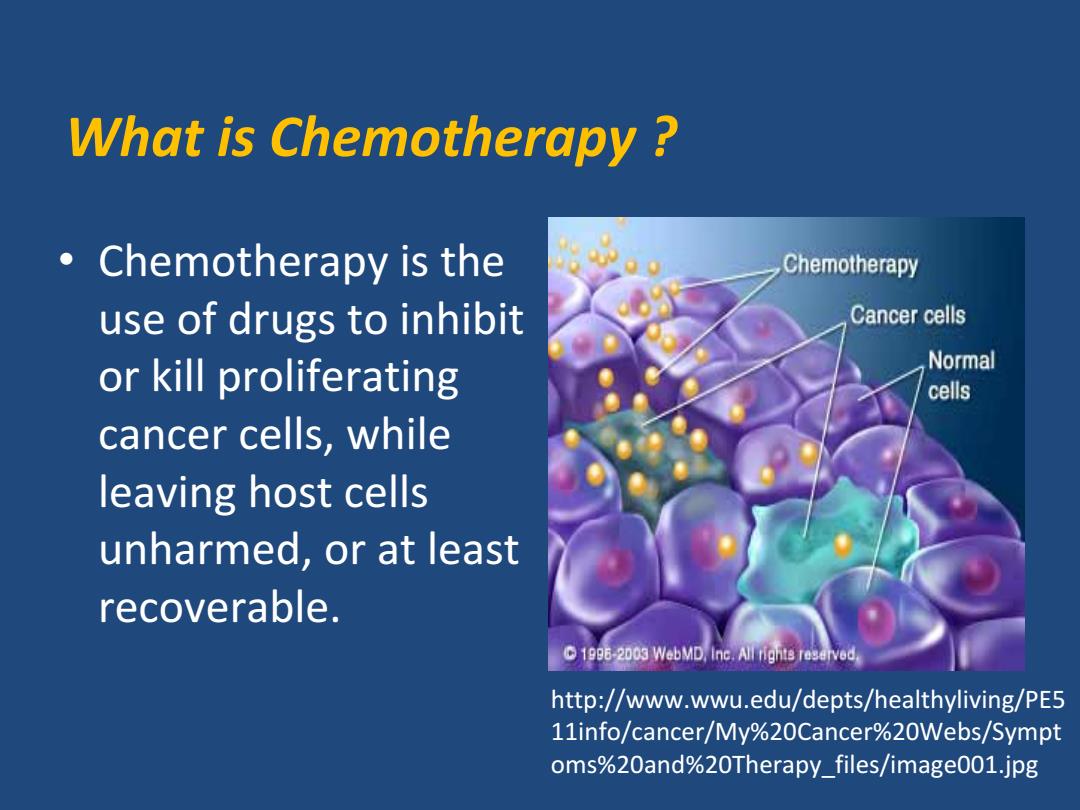
What is Chemotherapy 。 Chemotherapy is the Chemotherapy use of drugs to inhibit Cancer cells or kill proliferating Normal cells cancer cells,while leaving host cells unharmed,or at least recoverable. 1996-2003 WebMD,Inc.All rights reserved, http://www.wwu.edu/depts/healthyliving/PE5 11info/cancer/My%20Cancer%20Webs/Sympt oms%20and%20Therapy_files/image001.jpg
What is Chemotherapy ? • Chemotherapy is the use of drugs to inhibit or kill proliferating cancer cells, while leaving host cells unharmed, or at least recoverable. http://www.wwu.edu/depts/healthyliving/PE5 11info/cancer/My%20Cancer%20Webs/Sympt oms%20and%20Therapy_files/image001.jpg
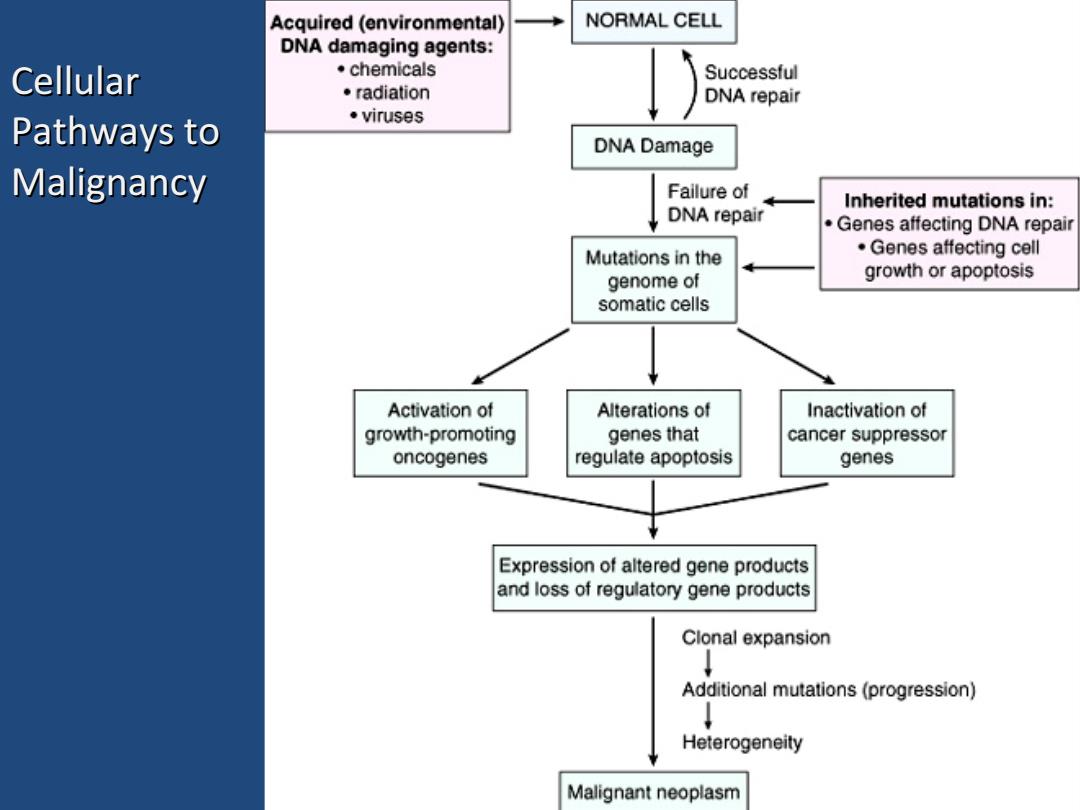
Acquired(environmental) NORMAL CELL DNA damaging agents: Cellular ◆chemicals Successful radiation DNA repair Pathways to ·viruses DNA Damage Malignancy Failure of Inherited mutations in: DNA repair Genes affecting DNA repair Mutations in the ·Genes affecting cell genome of growth or apoptosis somatic cells Activation of Alterations of Inactivation of growth-promoting genes that cancer suppressor oncogenes regulate apoptosis genes Expression of altered gene products and loss of regulatory gene products Clonal expansion Additional mutations (progression) Heterogeneity Malignant neoplasm
Cellular Cellular Pathways Pathwaysto Malignancy Malignancy
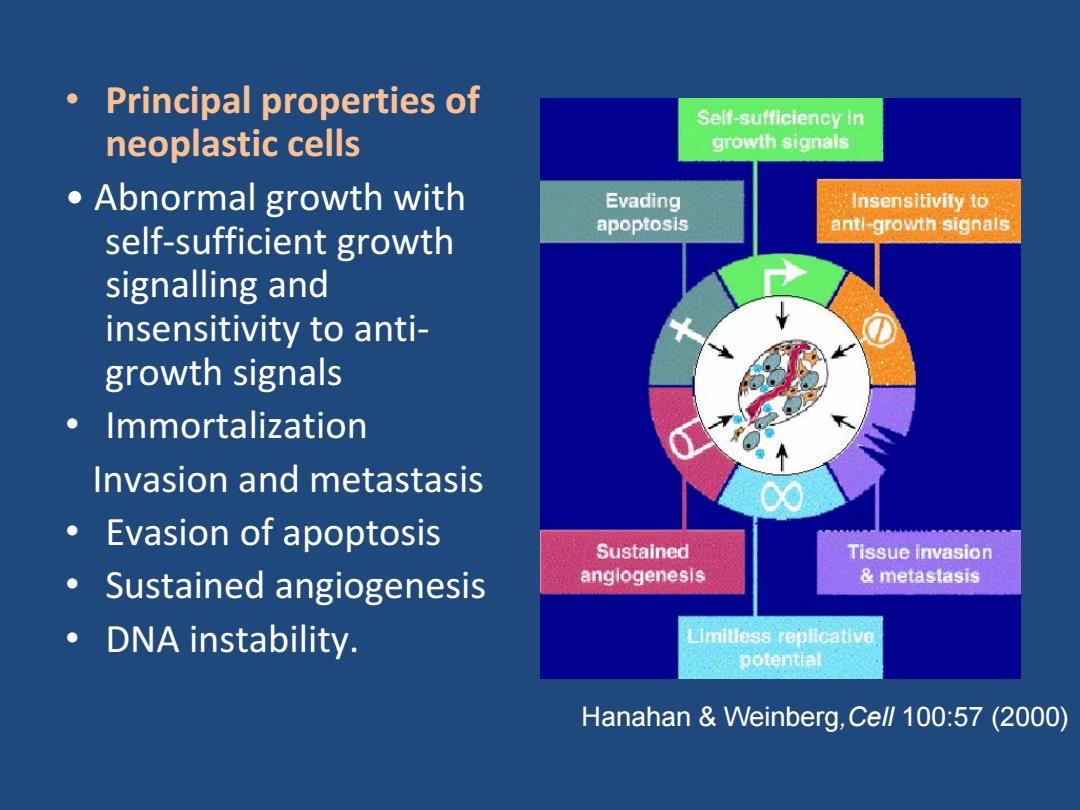
Principal properties of Self-sufficiency in neoplastic cells growth signals ●Abnormal growth with Evading Insensitivity to self-sufficient growth apoptosis anti-growth signals signalling and insensitivity to anti- growth signals Immortalization Invasion and metastasis Evasion of apoptosis Sustained Tissue invasion Sustained angiogenesis anglogenesis metastasis DNA instability. Limitless replicative potential Hanahan&Neinberg,Ce∥100:57(200o)
• Principal properties of neoplastic cells • Abnormal growth with self‐sufficient growth signalling and insensitivity to anti‐ growth signals • Immortalization Invasion and metastasis • Evasion of apoptosis • Sustained angiogenesis • DNA instability. Hanahan & Weinberg,Cell 100:57 (2000)
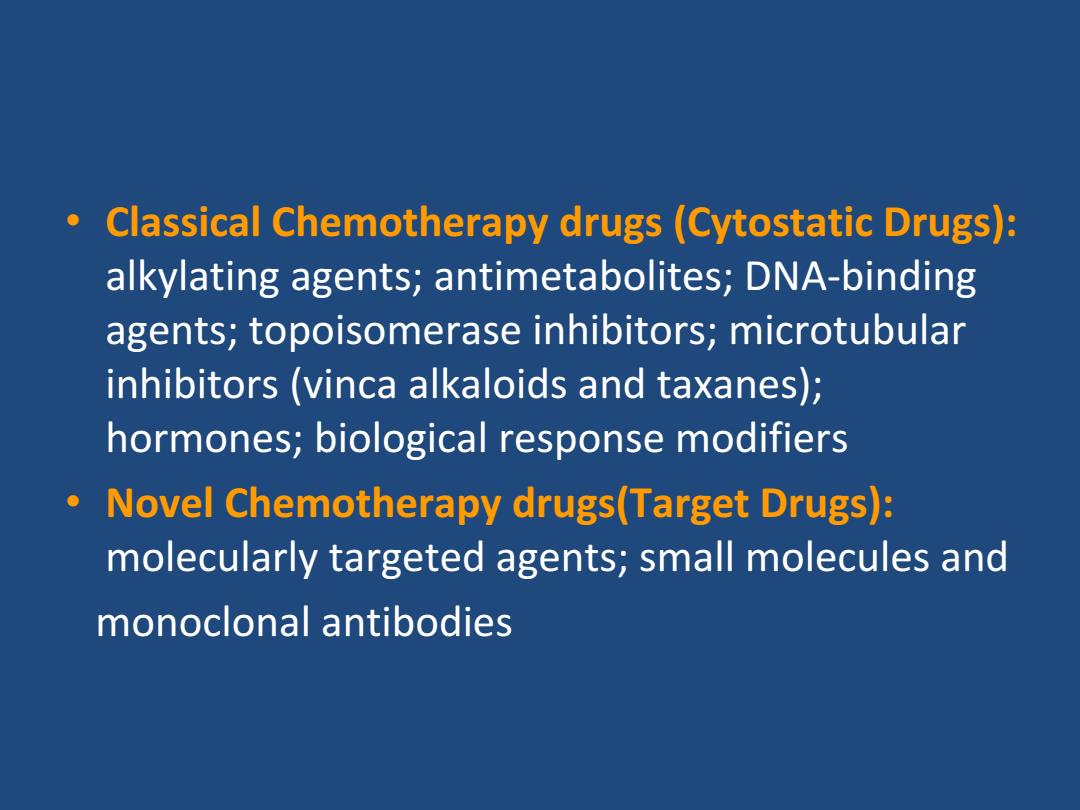
Classical Chemotherapy drugs (Cytostatic Drugs): alkylating agents;antimetabolites;DNA-binding agents;topoisomerase inhibitors;microtubular inhibitors (vinca alkaloids and taxanes); hormones;biological response modifiers Novel Chemotherapy drugs(Target Drugs): molecularly targeted agents;small molecules and monoclonal antibodies
• Classical Chemotherapy drugs (Cytostatic Drugs): alkylating agents; antimetabolites; DNA‐binding agents; topoisomerase inhibitors; microtubular inhibitors (vinca alkaloids and taxanes); hormones; biological response modifiers • Novel Chemotherapy drugs(Target Drugs): molecularly targeted agents; small molecules and monoclonal antibodies
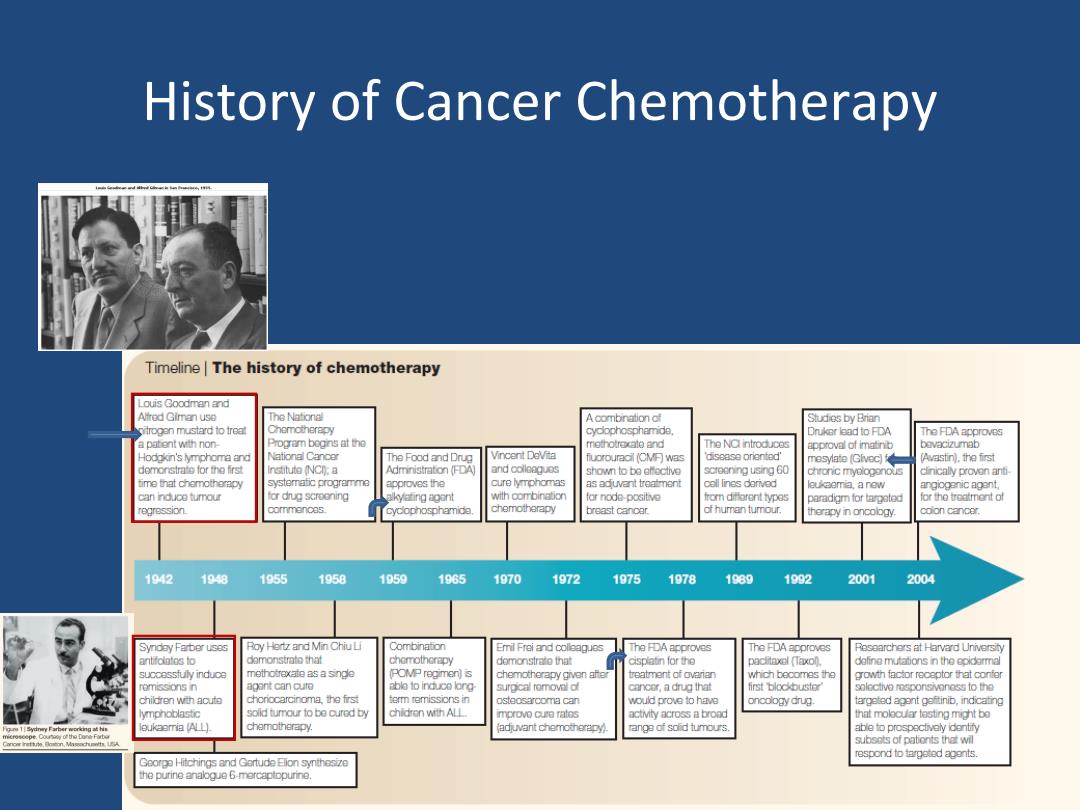
History of Cancer Chemotherapy Timeline The history of chemotherapy Louis Goodman and Nlfred Giman use The National A combnation of Studies by Bran trogen mustard to treat Chemotherapy cyoophosphamde. Druker lead to FDA The FDA approves a patent with non Program begns at the methotrecate and The Na introduces pproval of ima出rnt bevacizumab Hodgkn's lymphoma and National Cancer The Food and Drug Vincent DeVita fiucrouradil C日W阳s disease orented' me9yM相e (Glvec Avastin).the first demonstrato for the first nstitute (NCD:a Administration (FDA) and colleegues shown to be effective screening using 60 chronic myelogonos cinically proven anti time that chemotherapy systematic programme approves th阳 cure lymphomas as aduvant treatment coll lines darved leuaema,a new angiopenic apent, can ind ce tumou ad九g scrooning k内Mating agont with combination for node-positive fromn diforent types pa田digm for tarpated or the treatment of regression. commences. cycophosphamide chemotherapy breast canoar. of human tumour. therapy in oncology. coion cancer. 1942 1948 1955 1958 1959 1965 1970 1972 1975 1978 1989 1992 2001 2004 Syndey Farber uses Roy Hertz and Min ChiuL Combnaton Eml Frei and coleagues The PDA approves The FDA approves Researchers at Harvard University anto如gsto omonstrato that chomotherapy domonstrate that cisplatin for the pacitaxel (Taxon deline mutations in the eoidarmal successfuly induce methotrexate as a snge POMP regimen)s chemotherapy given a时e treatment of overan which becomes the growth factor receptor that confer remssons n apont can cuto able to induco long surpcal romovel of cancer,a drug that first bloo buster solectivo rosponsivonass to the c九hildren wth acute chonocarcinoma,the frst term temissions in osteosarcoma can would prove to have oncology drug. argeted agent geftinib,indicating ymphoblastic solid tumour to be oured by chidron with ALL mprovo cure rates actMty across a brond that moloouar tasting might be eukaemia风 chamotherapy. adjuvant chemotherapy) range of soid tumours able to prospectvely identity subsots of pationts thet wil espond to坦geted apents. Georpe Hitchings and Gortude Elion synthesize the purine analogue 6-mercaptopurine
History of Cancer Chemotherapy
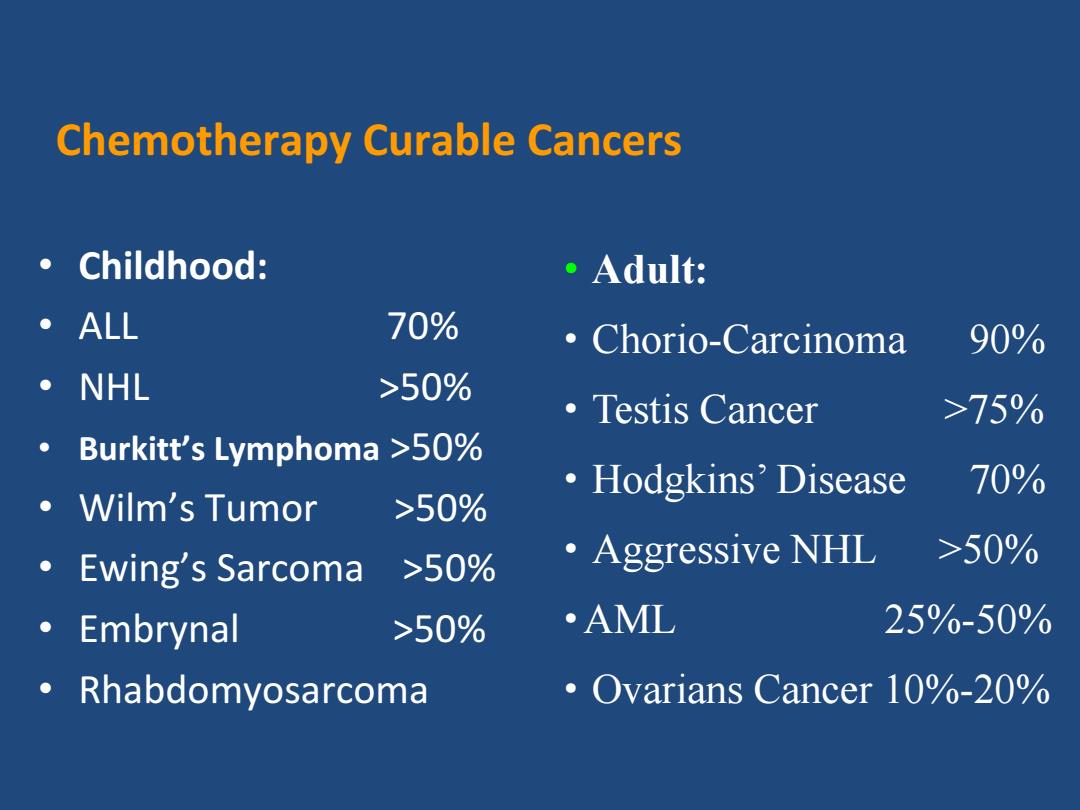
Chemotherapy Curable Cancers Childhood: 。Adult: ● ALL 70% ·Chorio-Carcinoma 90% NHL >50% ·Testis Cancer >75% Burkitt's Lymphoma >50% 。Hodgkins'Disease 70% 。Wilm's Tumor >50% Ewing's Sarcoma >50% ·Aggressive NHL >50% Embrynal >50% ·AML 25%-50% ● Rhabdomyosarcoma Ovarians Cancer 10%-20%
Chemotherapy Curable Cancers • Childhood: • ALL 70% • NHL >50% • Burkitt’s Lymphoma >50% • Wilm’s Tumor >50% • Ewing’s Sarcoma >50% • Embrynal >50% • Rhabdomyosarcoma ·Adult: ·Chorio-Carcinoma 90% ·Testis Cancer >75% ·Hodgkins’ Disease 70% ·Aggressive NHL >50% ·AML 25%-50% ·Ovarians Cancer 10%-20%
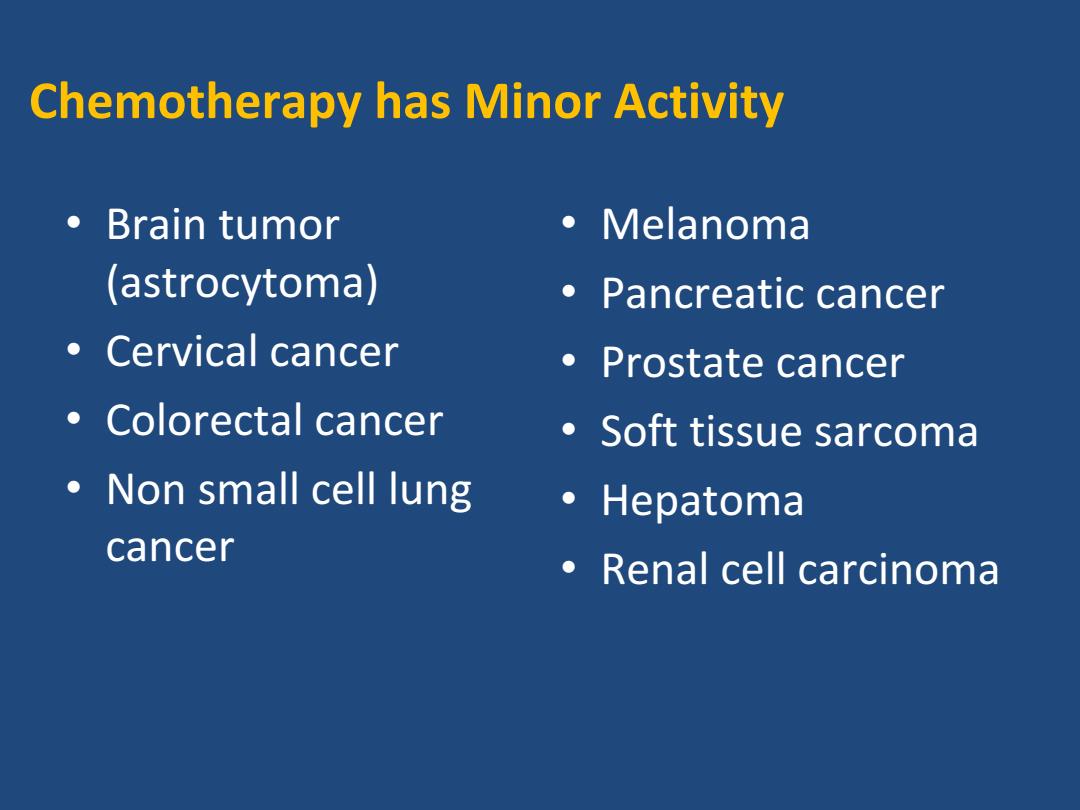
Chemotherapy has Minor Activity 。 Brain tumor 。Melanoma (astrocytoma) ·Pancreatic cancer 。Cervical cancer ·Prostate cancer Colorectal cancer ·Soft tissue sarcoma Non small cell lung 。Hepatoma cancer 。Renal cell carcinoma
Chemotherapy has Minor Activity • Brain tumor (astrocytoma) • Cervical cancer • Colorectal cancer • Non small cell lung cancer • Melanoma • Pancreatic cancer • Prostate cancer • Soft tissue sarcoma • Hepatoma • Renal cell carcinoma